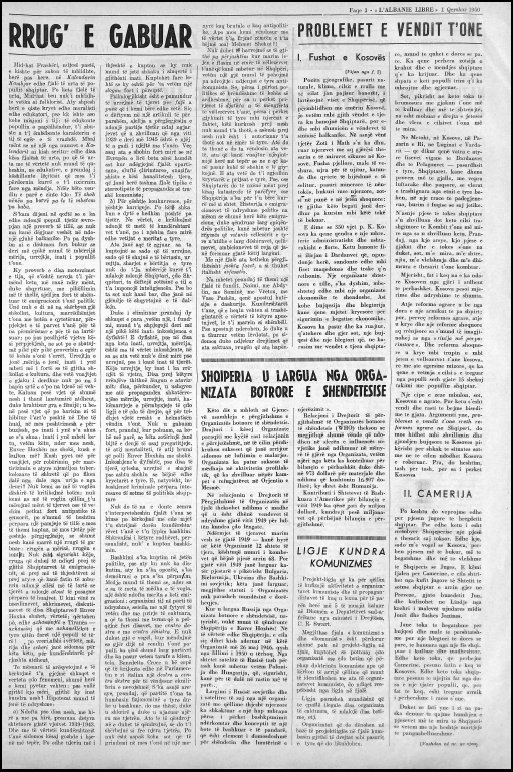
ALBANIAN NATIONALISM
The term ‘nationalism’ and the qualification of ‘nationalist’ often recur in these columns of ours as well as in those of the organs of other anti-communist Albanian parties or groups. We don’t want to fall victim to malicious interpretations. Far be it from us to include aggressive intentions in the content of our nationalism. This term is used by us to contrast it with that of communism. After all, Albania, a tiny state, does not scare anyone. Indeed, it is aware of its fragility among neighboring peoples possessed by overbearing lusts for expansion. And it takes the measures it can.
For the Albanians, Nationalism means a strenuous defense of their national positions and nothing else.
Before, the Western world lived on clear ideas, which today unfortunately have become cloudy. The West has enclosed itself in a penumbra where it is not known whether it is a prelude to a new dawn or to a night of dark barbarism. In the tangle of ambiguous ideas, in the Babylonian confusion of terms, all today claim to use the elements of language in the most arbitrary meanings, as long as this is to their exclusive advantage. A small people wants to preserve their ethnic individuality, defend the soil inherited from their ancestors, organize themselves in state systems suited to their nature, live their life on the rhythm of their traditions; behold, there is someone who inveighs against these harmless intentions and accuses him of a disruptive spirit and denies him the right to independence.
Two weights and two measures. Other peoples, obsessed with an imperialistic lust, harboring insane dreams of violent expansion in their innermost regions, assume the attitude of impartial judges, forgetting or pretending to forget the flagrant contrast between their assertions and their visible actions. Like Father Zappata 1.
A hellenic paper that often unofficially interprets the opinion of the most important political circles in Athens, lashes out in bitter invectives against the Albanians, especially targeting our newspaper, guilty of warmly pleading the just cause of national rights. Invectives are not the best way to clarify certain unfortunate situations between finite peoples, which common sense would advise to agree to face today, and in the future, to evident and looming common dangers. Passion blinds and deprives us of the use of reason. Who is the erudite author of the article picking on? The Albanian Cominformists? The nationalist exiles?
The voluntary lack of discrimination reveals the manifest intention of attacking all true Albanians, for the simple fact that, when it comes to the sacred terms of the homeland, soliciting the support of Austria (confirmed in the article), today or tomorrow, of whoever else is willing to grant it, they oppose the impairment of the already too mutilated national territory. This kind of nationalism seems strange to the Athenian writer. We are sorry, but we do not know how to reconcile the opposing concessions differently. Perhaps, if the Albanian people were not so small in number, we would be tempted, and examples are not lacking, to profess a nationalism of a different kind and tone. As fate would have it, in order to safeguard the threatened patrimony of our national interests, we were forced out of absolute necessity to accept the help, over the centuries, of those who found their own advantage in offering it. Albania needs, and is aware of, the friendship of all: of the highest world powers, of the major and minor European states. Today it is sacrificed by the claws of Soviet imperialism. She turns her eyes outside the geographical barriers transformed into horrible prison bars. She would like to find friendly looks that respond to her painful and mute appeal. The writer, on the other hand, makes a grim face. Let’s hope we don’t do it in the name of hellenic diplomacy.
Let us breathe serenely in our nationalism, that is, in the genuine and enlightened sentiment of the real interests of your nation; consider the past, the present, the future with openness, intelligently weigh the dangers and advantages of your passionate political conception and in the end you will admit that those surpass these and that, therefore, Greek nationalists have everything to gain by not only endorsing but reinforcing Albanian nationalism.
But regarding the article of the unofficial Athenian organ, others on these columns will deal with a wealth of more specific arguments. Let us end here by declaring that the Albanians who have long been thinking about the future of the nation have maintained a firm and precise line towards Greece. It is hellenic politics that fluctuate and do not decide to crystallize in the only way possible and continue with its brilliantly conceived true interests.
1 A friar who didn’t practice what he preached, protagonist of a play by the Florentine vernacular company “Il Marzocco”, performed for the first time in May 1926




